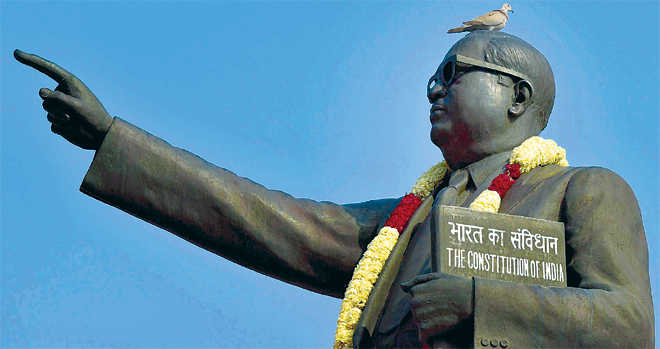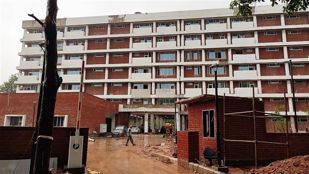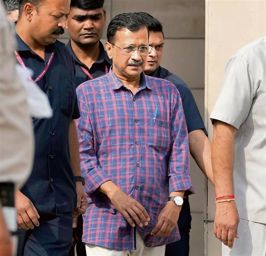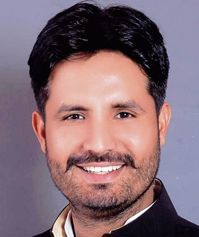
Dr Ambedkar''s speeches in the Constituent Assembly have been taken out of context and misinterpreted.
Ranbir Singh
Former dean, social sciences, Kurukshetra University
Bharat Ratna Bhim Rao Ambedkar has rightly been recognised as one of the makers of modern India. His role in the drafting of the Indian Constitution has been aptly acknowledged; he is legitimately credited for the emancipation of Dalits. But, his role in the emancipation of women and for the cause of peasants and workers has not received adequate attention; his contribution as an interdisciplinary social scientist remains ignored; his stand on secularism and socialism remains misunderstood; his views on Panchayati Raj have been misrepresented.
Baba’s role in empowerment of women
Baba Saheb Bhim Rao Ambedkar had played an important role in the empowerment of women. He ensured equal rights to them through the chapter on Fundamental Rights in the Indian Constitution. Consequently, they got the right to equality and the right to constitutional remedies. Baba Saheb also made provisions like equal pay for equal work for them in the Directive Principles of State Policy.
He made an unsuccessful attempt, too, to give them the right to marriage, the right to divorce as well as the right to property through the Hindu Code Bill, which he had moved as the Union Minister of Law in 1951. When he did not succeed because of opposition from rightists in the Congress party and the failure of Nehru to stand by him due to pragmatic reasons, he sacrificed his political career. Baba Saheb resigned as Law Minister and had to remain in political wilderness till his death in 1956.
He made efforts to regain political power through the Scheduled Castes Federation and later through the Republican Party of India, but failed because the Congress had usurped the credit for giving reservation to the SCs and created SC leaders like Babu Jagjiwan Ram to cut Baba Saheb to size. It is a different matter that Nehru subsequently gave a statutory shape to Baba Saheb's unfinished agenda by getting the Hindu Marriage Act and Hindu Succession Act enacted.
Cause of peasants and workers
His contribution to the cause of peasants and workers remains unrecognised. He had formed the Labour Party for this purpose in the colonial period. Ambedkar had also submitted a Memorandum to the Constituent Assembly on behalf of the Scheduled Castes Federation in which he had demanded nationalisation of land and industries for the salvation of the landless peasants and working class. It is a different matter that the memorandum was ignored by Constituent Assembly members who had been elected by the MLAs elected by the pauperised classes or were the nominees of the Princes of India. The Congress had an overwhelming majority, yet it was under the stranglehold of rightist forces.
A social scientist
Baba Saheb also made a significant contribution as a social scientist by using the inter-disciplinary approach because of his command on history, sociology, anthropology, economics, political science and jurisprudence. He had MA and PhD degrees in economics from Columbia University of the USA and MSc and PhD degrees in the same discipline from the University of London, and the bar-at-law degree from Grey's Inn. He had also studied anthropology. Above all, he had a deep understanding of the history, culture, economics, politics and psyche of the Indian society. This is reflected in his writings, like Annihilation of Castes, Who were Sudras, Buddha and His Dhamma and What Congress has done for the Untouchables?
Ambedkar's stand on secularism and socialism needs an objective analysis. His speeches in the Constituent Assembly have been taken out of context and misinterpreted or misunderstood. The record needs to be straightened by examining them in the proper context and by keeping in view his ideological perspective and broad objectives. It is a fact that he did not accept the amendment in Article-I of the Constitution demanding the inclusion of the words 'secular' and 'socialist' that has been moved by Prof KT Shah. He rejected it because it would have been superfluous to do so. The concept of secularism was implicit in the Preamble and in the chapter on Fundamental Rights, and that of socialism had been incorporated in the Directive Principles of State Policy. Baba Saheb did not want to disturb the consensus that had been built on these issues in the Constituent Assembly. Nehru had a similar stance. It is uncharitable to claim that Ambedker was opposed to secularism and socialism. He was committed to both.
Baba’s stand on Panchayati Raj
It has also been wrongly alleged that Ambedkar was opposed to Panchayati Raj. It is a fact that Ambedkar wanted a modern constitution for India. It is also a fact that he was not in favour of the Gandhian concepts of gram swaraj. He did declare his happiness over the fact that instead of village, individual has been made a unit in the Constitution of India. But, as is evident from his speech on the Bombay Village Panchayat Bill (1931) in the Bombay Legislative Council in 1932, he was not opposed to decentralisation of power to panchayats. Ambedkar was opposed only to the traditional panchayats, the so-called 'Little Republics' that had remained silent spectators of India's invasion by foreigners and which had been oppressing the Dalits. And he also wanted reservation in the panchayats for them. When K Santhanam moved an amendment that 'State shall create village Panchayats as institutions of self government', he had no hesitation in accepting it and in making it Article 40 of the Directive Principles of State Policy.
Dr Ambedkar has to be acknowledged as a great political thinker. He can be compared with Gandhi and MN Roy. His contribution to the modern Indian political thought is in no way less important than that of Nehru, Jayaprakash Narayan and Ram Manohar Lohia. Although he did not write a political treatise like Marx and other western political thinkers, he did record his political thought in his writings and speeches.



























